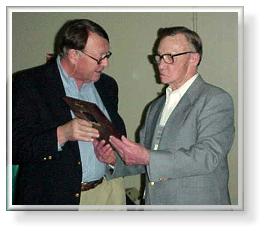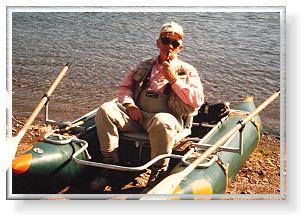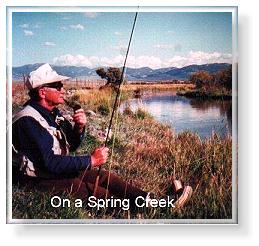 During the Fly Fishing Show in Somerset New Jersey, Leon Chandler was inducted into the
National Freshwater Fishing Hall of Fame. Not only was he given such prestigious
recognition, he was given their highest honor, the Enshrinement Award. I had the
pleasure and privilege to spend some time talking to him about his life and accomplishments.
During the Fly Fishing Show in Somerset New Jersey, Leon Chandler was inducted into the
National Freshwater Fishing Hall of Fame. Not only was he given such prestigious
recognition, he was given their highest honor, the Enshrinement Award. I had the
pleasure and privilege to spend some time talking to him about his life and accomplishments.
Everyone starts somewhere. I was not surprised to learn that Leon Chandler grew up on a farm.
When you meet him you're immediately drawn to his warmth and genuineness.
" I grew up on a small farm on the edge of the Missouri Ozarks during the depression. I went
to high school, spent a year at a business college, and went up to Cortland, New York to visit
a relative. I arrived in the summer of 1941, kinda liked it, a nice place to live. I got a job in the
furniture department in a Montgomery Ward store for three or four months. Then I answered
an ad in a newspaper for The Cortland Line Company. And I joined them on December 12,
1941 in the accounting department. After about a year, this was shortly after Pearl Harbor,
1942, I went into the army and was assigned to the signal corps as a cryptographer. We
encoded and decoded messages sent out over the radio. I spent two and a half years in
New Guinea and the Philippines until the end of WWII."
From his roots on the farm to serving his country Leon Chandlers dedication to doing his
best in any of his endeavors continued with his return to the Cortland Line Company where
he worked for over fifty years before retiring.
"When I came back from the war, I was assigned to the sales department of the Cortland
Line Company, that's when my education began. I had to learn why lines were made the
way they were, how they were used, and what equipment went with them. As a junior
member of the Cortland sales corps, I got the assignment to take our exhibit to the
outdoors shows around the country. We would exhibit in shows at places like Minneapolis,
Milwaukee, Chicago, St. Louis, Kansas City and Dallas. I would leave home at the end
of January and would virtually not get home until Easter. That job made it necessary for
me to know the answers to the questions that people would ask when I was working
the Cortland."
" So, I had to learn how to do those things. I read books, I read magazine articles, I read
everything that I could in order to refine my skills and increase my knowledge of sport fishing.
Because Cortland has been known for most of its history for the quality of its fly line, I
suppose it's natural that I became the 'fly line-fly fishing' person at Cortland. That served
me well. Through the years I've had so many memorable personal experiences."
"One, for example, back in 1961, a man from the U.S. State Department came to me at
one of the shows and told me they were funding a U.S. exhibit in Helsinki Finland and they
would like to get the sport fishing element in their exhibit. They asked me if I would be
interested in going to Finland and demonstrating American fishing equipment; in the meantime
showing the importance of sport fishing in American recreational life. I did that in 1961, and
that worked out very well. We had very good attendance at our clinic and Finland has
something like 60,000 lakes, so everyone had some knowledge of sport fishing and that
drew them to us."
 "That was so successful they came back and asked me if I would do the same thing at a
trade's exhibit in Poznan, Poland in 1963. Now that was during the iron curtain time and
I went to Poland and I spent three weeks there at the American exhibit demonstrating
American fishing gear and technique. The American exhibit was one of the more popular
locations in the entire complex. We estimate that we appeared before half a million people
in that three week event. I could accommodate about 1500 people around a pool at one
time, we'd move them in, move them out, move another group in, a very satisfying personal
experience."
"That was so successful they came back and asked me if I would do the same thing at a
trade's exhibit in Poznan, Poland in 1963. Now that was during the iron curtain time and
I went to Poland and I spent three weeks there at the American exhibit demonstrating
American fishing gear and technique. The American exhibit was one of the more popular
locations in the entire complex. We estimate that we appeared before half a million people
in that three week event. I could accommodate about 1500 people around a pool at one
time, we'd move them in, move them out, move another group in, a very satisfying personal
experience."
"In 1965, I was asked to do the same thing in Budapest, Hungary. It was also an iron curtain
country. The last one of those I did was in 1970. I went to Berlin and I did the same thing at
a US exhibit there, that was at a time during the cold war when Berlin was completely
surrounded by East Germany.
Another important thing, too, I relate these things only as an example of the benefits that
have accrued to me as a result of having been involved in the manufacturing sport fishing
equipment. Fishing equipment is positive. There are very few negatives to manufacturing
fishing line. It's been an enjoyable experience. I retired in 1992 after spending fifty and
a half years with one company."

Leon Chandler became known as 'America's Ambassador of Fly Fishing,' as well as
'Mr. Cortland.' I couldn't help but wonder how he was involved with the rest of the
company. His fondness for Cortland and the folks he worked with was evident. When he's
not off fishing somewhere, Leon still drops by the plant a couple of times a week.
"Through the years
initially when I first started, we were making only fishing line, but
as our company grew, and as fishing grew, we got into rod, reels, leaders and all sorts
of accessories. Cortland is a unique little company, located in Cortland, NY, a little city
of about 20,000 people. Cortland Line Company is completely employee-owned 100%,
and that gives our people reason to take great pride in the quality of our products. While
I'm not there anymore (I retired in 1992) I take great pride in the reputation which my
old company deserves."
When I asked Leon Chandler, and was graciously granted an interview, he provided me
with a brief biography. I was amazed at the number of awards he had received. I asked
which award meant the most.
"I appreciate and am honored by all of them. This one I received today has to be high on
the list because that award, the Hall of Fame award, encompasses not only fly fishing, but
all of sport fishing. Most of the other awards have been involved with my role in fly fishing.
In 1992, I think it was, Fly Rod and Reel was kind enough to name me
their Angler of the Year, which was very special. I can't remember them all now,
but I'm running out of wall space in my home."
"Since I retired, I've bought a motor home, and I use it extensively for fishing. I live alone,
my wife died several years ago. When she died, my life changed directions rather abruptly,
and I started thinking then about buying a motor home. I did, and I use it for fishing. During
the spring months, I fish the Catskill mountain streams, well known by the names of the
Beaverkill and the Delaware. Then along about the middle of July, I go out west and I
wander around Montana, Idaho, Wyoming, and sometimes I go up into Alberta and British
Columbia. I have become a sort of fishing bum. I can assure you, no one enjoys a chosen
lifestyle more than I enjoy mine. I know there are a lot of people that are envious of my
lifestyle. I tell them it's easy, all you have to do is work for one company for fifty years
and retire and go fishing."
I suppose any natural progression in a conversation about fishing works around to wanting
to know the other's secrets. Probably the most often asked questions in fly fishing, what's
your favorite fish, and what is your favorite fly had to be asked.
Leon's reply, "My favorite fish is the bonefish. Bonefish are found in tropical water. One
of the reasons I like them is that I like the places they live. Places like the Florida Keys, the
Bahamas, Belize, the Yucatan Peninsula of Mexico, Venezuela and the best place of
all Christmas Island in the South Pacific. The bonefish is particularly appealing to
me because of the uniqueness of the habitat they live in; deep waters. The areas where
we fish for bonefish are what we call flats, shallow areas, which at low tide might be
dry sand. When the tide comes in, it floods the flat. Then the bonefish come out of
deep water, and they cruise the flat looking for crabs and other crustaceans."
"The bone-fishermen stalks the flats looking for fish, and doesn't cast until he see's one.
They're very spooky because they've been in deep water and now they're in shallow.
The fly-fisher casts far enough ahead of them so they don't spook when it lands, maybe
eight or ten feet. He's seeing all this and waits for the fish to approach the fly and then
gives it a little action with his line. If the bonefish picks it up, (he's trying to get back to
deep water), he may run a hundred yards in one run. That's the thrill of bonefishing.
It's kind of like hooking a fish on the goal line of a football field and having your fish
instantly on the other goal line, and still going away. That's the thrill of bonefishing.
Bonefish are not considered edible, they're always released. It's a specialized kind
of fishing that appeals to me and I use any opportunity I can to go bonefishing. In fact,
in about two weeks now I'm heading for the Florida Keys to see if I can find a bonefish."
Leon surprised me about his love for Bonefish. What he had told me about his travels led
me to think he was a die-hard trout man. What catches fish for Leon Chandler? He has
made the statement that even though he had a large influence in developing the fly line,
presentation was the most important element in being successful at catching fish.
What flies does he use?
 "It would depend on the conditions, of course, and depend on what's happening. I think
we catch more fish on the flies that we use more. For dry fly fishing I have pretty much
settled into those style flies that have what I call a belly in the water. These are the
parachutes and the comparaduns and flies of those type. I just naturally choose those
because I have more confidence in them. It depends entirely on what's happening.
The first thing I do when I approach a stream is to sit down on the bank or on a log
and watch and look to see what's happening. I never rush right into the stream. I think
Yogi Berra was quoted as saying one time "You can see a lot of things by observing."
So observation is particularly important in fly fishing, I think."
"It would depend on the conditions, of course, and depend on what's happening. I think
we catch more fish on the flies that we use more. For dry fly fishing I have pretty much
settled into those style flies that have what I call a belly in the water. These are the
parachutes and the comparaduns and flies of those type. I just naturally choose those
because I have more confidence in them. It depends entirely on what's happening.
The first thing I do when I approach a stream is to sit down on the bank or on a log
and watch and look to see what's happening. I never rush right into the stream. I think
Yogi Berra was quoted as saying one time "You can see a lot of things by observing."
So observation is particularly important in fly fishing, I think."
"My dry flies would probably be the parachute Adams or the Comparaduns, different color
depth and different sizes. I like bead-head nymphs. I'm using bead-heads almost entirely now,
the hare's ear and the pheasant tails and so forth. In streamer flies, I think if I could have just
one fly, to take with me to strange water, it would probably be the woolly bugger, either a black
or an olive woolly booger. The woolly bugger is an excellent fly."
There is no way I can describe my feelings while interviewing Leon Chandler. One afternoon
did not even begin to scratch the surface of the life this man has led. No award was 'given'
to Leon; he worked and earned every one he has received. There is another side of him,
however-- a sense of humor I was just able to glimpse. I have to share it. I only wish you
could see his expression and hear his deep chuckle as he told this to me.
Leon Chandler On The Proper Way To Eat Oreo's:
"The proper way to eat Oreo's and milk, has to be practiced. You start by filling up
a glass to whatever level you want with milk and then you very carefully stack the Oreo's
alongside the glass at the exact same level as the milk. Then you eat an Oreo, take a sip
of milk, eat an Oreo, take a sip of milk, etc. If your Oreo's run out before your milk is gone,
then your sips aren't big enough. If your milk is gone before your Oreo's are gone, your sips
are too big. So, in either event, you have to start all over. Then you have to practice, and
practice, and practice. That's the proper way to eat an Oreo."
And this is Leon Chandler:
1965 Dolphin Award Fishing Hall of Fame
1975 Spinx Leadership Award "Lifetime Career" category: Sporting Goods Dealer
1982 Award of Merit AFTMA
1985 International Ambassador Award Federation of Fly Fisherman
1986 Honorary Lifetime Membership AFTMA
1988 National Freshwater Fishing Hall of Fame as Legendary Angler
1991 Fly Tackle Dealer Show presented an original Mike Stidman "Brown Trout"
painting as a gift of appreciation from the Fly Fishing Industry
1992 "1992 Angler of the Year," by Fly Rod and Reel Magazine, Personal Profile
article in Fly Fisherman Magazine, Unsung Hero Award Fishing Tackle Trade News
1994 Catskills Fly Fishing Center and Museum Hall of Fame, Lifetime Contribution
Award North American Fly Tackle Trade Association
2000 National Freshwater Fishing Hall of Fame, Enshrinement Award.
~ Susan Cox
|





